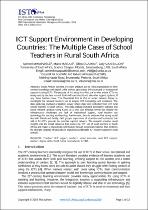 ResearchSpace
ResearchSpace
ICT support environment in developing countries: The multiple cases of school teachers in rural South Africa
JavaScript is disabled for your browser. Some features of this site may not work without it.
- ResearchSpace
- →
- Research Publications/Outputs
- →
- Conference Publications
- →
- View Item
| dc.contributor.author |
Mwapwele, S

|
|
| dc.contributor.author |
Marais, Mario A

|
|
| dc.contributor.author |
Dlamini, Sifiso B

|
|
| dc.contributor.author |
Van Biljon, J

|
|
| dc.date.accessioned | 2020-03-02T08:08:50Z | |
| dc.date.available | 2020-03-02T08:08:50Z | |
| dc.date.issued | 2019-11 | |
| dc.identifier.citation | Mwapwele, S., Marais, M.A., Dlamini, S. and Van Biljon, J. 2019. ICT support environment in developing countries: The multiple cases of school teachers in rural South Africa. IST-Africa 2019 Conference, 8-10 May 2019, Nairobi, Kenya | en_US |
| dc.identifier.isbn | 978-1-905824-62-5 | |
| dc.identifier.uri | http://www.ist-africa.org/Conference2019/default.asp?page=programme-new | |
| dc.identifier.uri | http://www.ist-africa.org/Conference2019/ | |
| dc.identifier.uri | http://hdl.handle.net/10204/11309 | |
| dc.description | Copyright: 2019 The authors | en_US |
| dc.description.abstract | South African teachers are under pressure due to rising expectations of their content knowledge and digital skills without guaranteed infrastructural or institutional support in using ICTs. The purpose of this study is to find out to what extent ICTs are being used by teachers in rural South African schools and also what support systems, if any, these teachers have. The theoretical lens is that of social network theory to investigate the network teachers use to acquire ICT knowledge and assistance. The data capturing involved a baseline survey where data were collected from 197 rural school teachers in South Africa. The data analysis included descriptive statistics and social network analysis using Kumu as a tool. Our findings reveal that despite the infrastructural challenges and lack of institutional support, rural teachers use technology for teaching and learning. Furthermore, there is evidence that strong social ties with friends and family, faith groups, department of education and businesses that sell or fix ICTs, provide the essential support network. The research provides novel insights into the social networks that sustain the ICT use of rural teachers in South Africa and makes a theoretical contribution through empirical evidence that confirms the strength (degree) of weak ties in explaining sustainable ICT teacher support in rural schools. | en_US |
| dc.language.iso | en | en_US |
| dc.publisher | International Information Management Corporation (IIMC) | en_US |
| dc.relation.ispartofseries | Worklist;23139 | |
| dc.subject | Teachers’ ICT support | en_US |
| dc.subject | Teachers’ social networks | en_US |
| dc.subject | Rural ICT support | en_US |
| dc.subject | South African rural schools | en_US |
| dc.subject | ICT4D | en_US |
| dc.subject | Teacher’s digital skills | en_US |
| dc.title | ICT support environment in developing countries: The multiple cases of school teachers in rural South Africa | en_US |
| dc.type | Conference Presentation | en_US |
| dc.identifier.apacitation | Mwapwele, S., Marais, M. A., Dlamini, S. B., & Van Biljon, J. (2019). ICT support environment in developing countries: The multiple cases of school teachers in rural South Africa. International Information Management Corporation (IIMC). http://hdl.handle.net/10204/11309 | en_ZA |
| dc.identifier.chicagocitation | Mwapwele, S, Mario A Marais, Sifiso B Dlamini, and J Van Biljon. "ICT support environment in developing countries: The multiple cases of school teachers in rural South Africa." (2019): http://hdl.handle.net/10204/11309 | en_ZA |
| dc.identifier.vancouvercitation | Mwapwele S, Marais MA, Dlamini SB, Van Biljon J, ICT support environment in developing countries: The multiple cases of school teachers in rural South Africa; International Information Management Corporation (IIMC); 2019. http://hdl.handle.net/10204/11309 . | en_ZA |
| dc.identifier.ris | TY - Conference Presentation AU - Mwapwele, S AU - Marais, Mario A AU - Dlamini, Sifiso B AU - Van Biljon, J AB - South African teachers are under pressure due to rising expectations of their content knowledge and digital skills without guaranteed infrastructural or institutional support in using ICTs. The purpose of this study is to find out to what extent ICTs are being used by teachers in rural South African schools and also what support systems, if any, these teachers have. The theoretical lens is that of social network theory to investigate the network teachers use to acquire ICT knowledge and assistance. The data capturing involved a baseline survey where data were collected from 197 rural school teachers in South Africa. The data analysis included descriptive statistics and social network analysis using Kumu as a tool. Our findings reveal that despite the infrastructural challenges and lack of institutional support, rural teachers use technology for teaching and learning. Furthermore, there is evidence that strong social ties with friends and family, faith groups, department of education and businesses that sell or fix ICTs, provide the essential support network. The research provides novel insights into the social networks that sustain the ICT use of rural teachers in South Africa and makes a theoretical contribution through empirical evidence that confirms the strength (degree) of weak ties in explaining sustainable ICT teacher support in rural schools. DA - 2019-11 DB - ResearchSpace DP - CSIR KW - Teachers’ ICT support KW - Teachers’ social networks KW - Rural ICT support KW - South African rural schools KW - ICT4D KW - Teacher’s digital skills LK - https://researchspace.csir.co.za PY - 2019 SM - 978-1-905824-62-5 T1 - ICT support environment in developing countries: The multiple cases of school teachers in rural South Africa TI - ICT support environment in developing countries: The multiple cases of school teachers in rural South Africa UR - http://hdl.handle.net/10204/11309 ER - | en_ZA |





